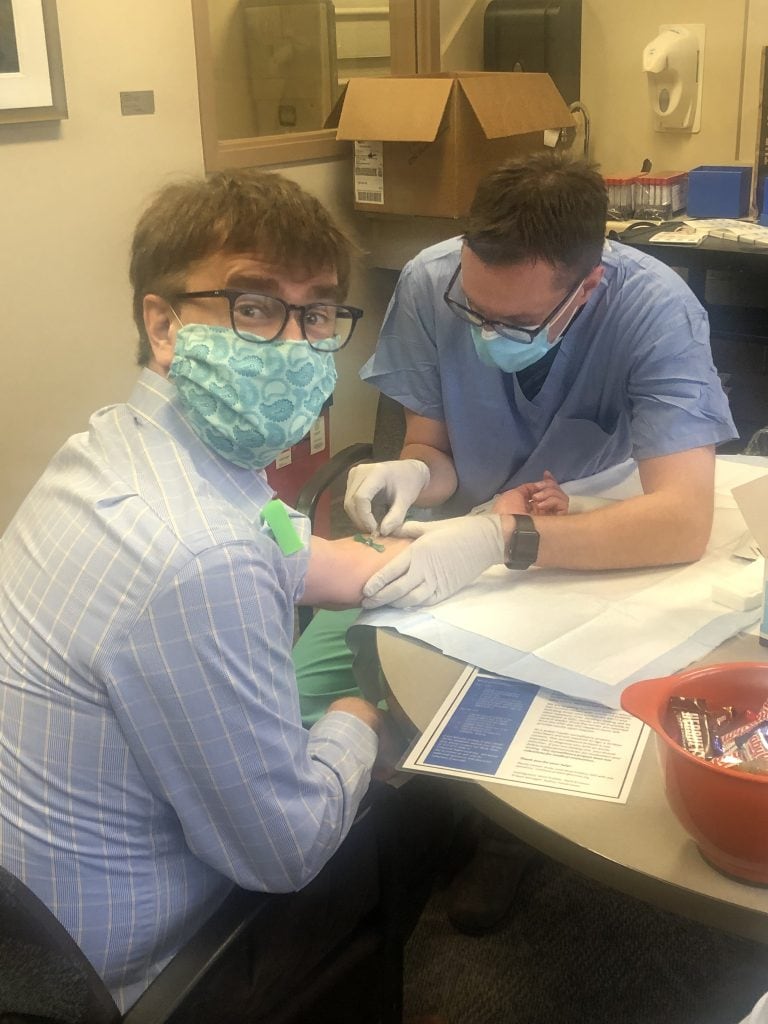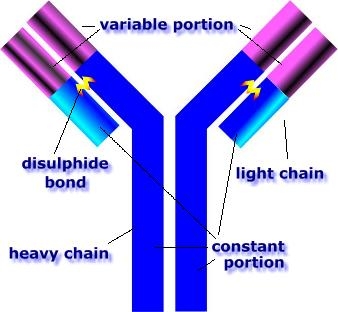
Lately, many of us are thinking quite a bit about antibodies. When’s the antibody test going to be ready? Can I get a test? Do I have antibodies? Will we be able to give antibodies from one person to another as a treatment? Are antibodies our ticket to resuming our normal lives?
What is an antibody, anyway?
In medicine, we talk about antibodies all the time, though I am far from an expert on the subject. I remember learning about them in Immunology lectures from medical school, at least when I wasn’t talking in class. I remember them as Y-shaped thingies in our blood. Yes, “Y-shaped thingies” is the correct medical term. They look like this:
At least they look that way in the textbook.

Photo: CC BY-SA 2.5, https://commons.wikimedia.org/w/index.php?curid=916435
Antibodies are the soldiers that live in our blood that fight foreign invaders to our bodies. The really cool thing is that once our bodies have encountered an invader like a virus or a bacteria, our bodies manufacture these antibodies in huge quantities. Those antibodies live in us long into the future so that when our bodies encounter that pathogenic invader at some future point, our bodies recognize it and are able to fight it off much more readily. This is the role of antibodies. When you think of it you may marvel at the elegance of a system that can learn from the past so as to be able to be prepared for future.
But that is exactly what antibodies do. Learn from the past. We as people could learn from our own immune systems about learning from the past!
The big questions in the COVID-19 pandemic may be answered with research into antibodies. So that is why I rolled up my sleeve in the picture above to see if my blood has any antibodies to SARS-CoV-2 (the real name of the COVID-19 virus). I was participating in a research project being conducted at Hennepin Healthcare where I work. The Centers for Disease Control (CDC) is conducting this study at 16 hospital sites around the country to help us understand how the human body is responding to this virus. The study is looking at healthcare workers (nurses, doctors, respiratory therapists, among others) who have been working with patients infected with COVID-19. I guess I qualify. The idea is to see how many of us are developing antibodies.
A quick shout out to Dr. Matt Prekker of Hennepin Healthcare. Not only is he leading the research on this antibody study in healthcare workers, he also is a board-certified doctor in 4 specialties at once: Critical Care, Internal Medicine, Pulmonary Medicine, and Emergency Medicine. Not only that, he is the guy drawing my blood in the picture above and he’s a great guy. He and his team of researchers are worthy of a “thank you” from all of us.
This is really important research. We used to call this virus the “novel coronavirus” because it is indeed novel – new – to the world. Due to that one fact, there was nobody on the entire planet who had any antibodies in their system. That’s also why it is so deadly because nobody has the foot soldiers – the antibodies – yet in place in their blood.
Once we learn more about the human body response to the virus, we should be able answer many of the questions for which our knowledge is currently lacking:
- Does getting COVID-19 protect you from future infections? We just don’t know but it will depend on the antibody response and how durable that response is over time.
- Do people develop antibodies even if they didn’t have symptoms?
- How quickly does the immune response develop?
- Importantly, can we use the antibodies from one person to treat another person who is really sick?
Vaccine research is based on immune response as well. Vaccines work by exposing your body to a teeny amount of the virus and allowing your own body to develop its regiment of antibodies. So these areas of research overlap.
I’ve heard it said that science will help get us out of this pandemic. Today I got a first-hand look at how that may look and it gives me renewed hope.
Thanks for reading this blog. Subscribe by e-mail if you wish to receive periodic notifications of future posts. My Twitter account is @DrDavidHilden for occasional updates from me as well.
David
